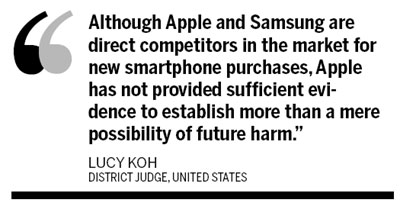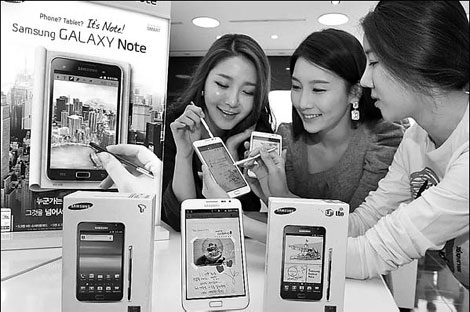Apple asks Samsung to stop copying
Updated: 2012-04-16 07:55
(China Daily)
|
||||||||
|
|
Latest move challenges decision on tablets, phones
Apple Inc, maker of the iPhone and iPad, asked a United States appeals court to block sales of some products made by Samsung Electronics Co that it contends "slavishly copy" the two devices.
"Apple is widely regarded as an innovator of beautiful designs," Apple lawyer Michael Jacobs of Morrison & Foerster told a three-judge panel of the US Court of Appeals for the Federal Circuit in Washington this month.
"What we're asking Samsung to do is stop copying. There are other beautiful designs out there."
Apple is challenging a trial judge's December decision allowing some of Samsung's Galaxy tablets and phones to remain on the market while a patent-infringement case is pending. The Cupertino, California-based smartphone maker contends Samsung has copied the look and feel of the iPhone and iPad to lure away customers. A trial is scheduled to begin July 30 in San Francisco.
"There is no clear error that would warrant reversing the judge's decision, especially since we're on a July trial schedule," said Samsung lawyer Kathleen Sullivan of Quinn Emanuel.
Jacobs said that it would be months before the judge in the case would rule on post-trial motions, so the request to halt sales quickly is still important.
Apple, Sullivan said, was trying to get a monopoly on rectangular tablets with flat screens and rounded corners.
"There was no evidence that consumers were basing their decision to buy a Samsung product or drop an Apple product because of design features," Sullivan said. "Our phones are very different if you strip out their over-broad claims."
The Samsung dispute is the biggest front in Apple's efforts to curtail the growth of phones that run on Google Inc's Android operating system, the most popular platform for mobile devices. Apple contends Android devices have copied features that make the iPhone and iPad unique, and it has also filed patent-infringement suits against Android-phone makers HTC Corp and Motorola Mobility Holdings Inc.
The case argued early this month is one of more than 30 filed in 10 countries between Samsung and Apple. Samsung was forced to delay the release of some Galaxy devices or alter the product in Germany, the Netherlands and Australia because of the legal battle.
The three judges questioned both sides on the proper standard for patent owners to block products where only one feature is infringing on a patent. Circuit Judge Timothy Bryson asked whether Ford Motor Co would be able to halt sales of Chrysler Corp cars that copied a cup-holder design.
"People may have been flocking to Chrysler and leaving Ford because they have neat ads or a great engine," Bryson said.
Jacobs said consumers buy phones for a number of reasons and there is evidence Samsung changed its designs in reaction to the popularity of the Apple products.
"Consumers make purchases because of the elegance of the user interface, and this is an element of the user interface," he said. To force a patent owner to prove that a design or feature alone drove sales "would set the bar too high" and limit the ability of a patent to exclude competition.
US District Judge Lucy Koh on Dec 2 denied Apple's request to halt sales of the Galaxy S 4G, Infuse 4G and Droid Charge phones and the Galaxy Tab 10.1 tablet computer made by Suwon, South Korea-based Samsung.
Koh said that while Apple had a good chance of winning the case on some of its claims, it would not suffer irreparable harm if Samsung were to remain on the market.
"Although Apple and Samsung are direct competitors in the market for new smartphone purchases, Apple has not provided sufficient evidence to establish more than a mere possibility of future harm," the judge said.
Apple introduced the iPhone in June 2007 and the iPad in April 2010. It claims that Samsung's Galaxy products "blatantly imitate the appearance of Apple's products to capitalize on Apple's success". Samsung began selling the Galaxy products that are the subject of the hearing in February 2011.
Apple claimed that Galaxy S and Infuse phones copied two of its patented designs, that the Galaxy Tab copied a design protected by a fourth patent, and that all three products, along with the Droid Charge, infringed on a patent for a function known as "bounce back". That feature means that when an image is dragged past the final screen's edge, it goes back to fill the entire screen.
Koh said it was a "close question" as to whether the phones infringe on the two design patents and said Samsung had raised a "substantial question" of invalidity of Apple's tablet patent. Samsung argued the tablet design was an obvious variation of tablets that existed as early as 1994, including one made by Hewlett-Packard Co.
As for the bounce-back patent, the judge said it would be unfair to block the Samsung products based on a single function of the device.
Apple and Samsung vie for the title of world's largest maker of smartphones. Apple had 23.9 percent of the global market in the fourth quarter, while Samsung was No 2 with 23.5 percent, according to data from Boston-based researcher Strategy Analytics.
In the tablet market, Apple had 58 percent of the market in the fourth quarter, while Android products, which also include Amazon.com Inc's Kindle Fire and Barnes & Noble Inc's Nook readers, had 39 percent, the analyst group said.
Bloomberg News in Washington


 Relief reaches isolated village
Relief reaches isolated village
 Rainfall poses new threats to quake-hit region
Rainfall poses new threats to quake-hit region
 Funerals begin for Boston bombing victims
Funerals begin for Boston bombing victims
 Quake takeaway from China's Air Force
Quake takeaway from China's Air Force
 Obama celebrates young inventors at science fair
Obama celebrates young inventors at science fair
 Earth Day marked around the world
Earth Day marked around the world
 Volunteer team helping students find sense of normalcy
Volunteer team helping students find sense of normalcy
 Ethnic groups quick to join rescue efforts
Ethnic groups quick to join rescue efforts
Most Viewed
Editor's Picks

|

|

|

|

|

|
Today's Top News
Health new priority for quake zone
Xi meets US top military officer
Japan's boats driven out of Diaoyu
China mulls online shopping legislation
Bird flu death toll rises to 22
Putin appoints new ambassador to China
Japanese ships blocked from Diaoyu Islands
Inspired by Guan, more Chinese pick up golf
US Weekly

|

|







